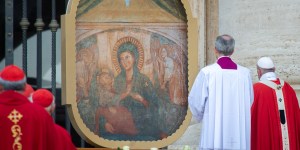Lenten Campaign 2025
This content is free of charge, as are all our articles.
Support us with a donation that is tax-deductible and enable us to continue to reach millions of readers.
I love living in St. Louis, which is a hidden oasis of Catholic beauty and often referred to as "the Rome of the West." The city got its start in 1764 when the French fur trader Pierre Laclede set up shop here on the banks of the Mississippi River. Since then, it has hosted a World's Fair, promoted the flight of Lindbergh across the Atlantic in his airplane Spirit of St. Louis, and served as the starting place for the Lewis and Clark expedition. At one point, the Archdiocese of St. Louis covered the entirety of the Louisiana Purchase.
I also love St. Louis, the patron saint of our wonderful old city. King Louis IX was ruler of France from 1226-1270 and is justly famous. His feast day is this week, and he's the only canonized French monarch. His life is an example of authentic piety. He went to Mass twice a day, every day, and warned his son that it would be better to physically die than to commit a single mortal sin – advice that his own mother had first passed on to him.
He was beloved as a ruler, freeing all the serfs who had been forced into unjust labor on farms, personally inviting poor citizens to dine at his table, and reforming the court system to make it more fair and to guarantee natural rights. He also founded several hospitals for the care of those who couldn't afford medical care.
Louis was also powerful, and was called upon to mediate disputes between other European rulers, including Pope Innocent IV and Emperor Frederick II.
He was famous for his courage. At one point during his crusading adventures, he was captured and held prisoner in a tent. His captors offered him freedom if he would swear an oath against God. While he made up his mind, they tried to motivate him by holding swords to his throat and threatening to massacre other Christians they were holding captive. Louis didn't need time to think. He refused to deny his faith.
Louis led an accomplished life. He had 11 children, maintained a strong and united kingdom, led armies, retrieved the crown of thorns from the Middle East, and built Sainte-Chapelle to house it. This little church is one of the jewels of medieval architecture.
The reason I'm going through a litany of his accomplishments is because although they were impressive, they don't seem to have meant all that much to him. He always signed his name as “Louis of Poissy,” and never signed or referred to himself as “Louis IX, King of France.”
Poissy is where he was baptized as an infant, and he said, "I think more of the place where I was baptized than of Rheims Cathedral where I was crowned. It is a greater thing to be a child of God than to be the ruler of a Kingdom. This last I shall lose at death but the other will be my passport to an everlasting glory."
This is a startling lesson in keeping perspective -- one that's interesting to contrast with many of the famous and accomplished people of our current time who have everything and still seem unhappy. Perhaps it's a lack of perspective, admittedly a lack that the vast majority of us share.
In my life, I have accomplished far, far less than Louis. History books won't remember me. I have very little reputation outside of my close circle of friends and family. The few modest accomplishments I do have, I cannot help but trumpet from the rooftops. I brag, name-drop, and subtly move conversations to myself. I value the wrong things and am distracted by what's not important. This ego-centrism feels good in the moment, but in the long run it's limiting. I'm literally not able to envision the full glory and splendor of the universe and my place within it. From this perspective, everything I see is flat and dull, workaday, boring.
Louis of Poissy reveals that it doesn't have to be this way. To him, at the very wellspring of existence is a miracle. He carries this memory of his eternal destiny with him for his entire life and it guides all of his actions. I cannot help but think that all of those great accomplishments of his are echoes of that one, over-arching moment in which he was reborn.
The most valuable, redeeming quality about us is that God knows and loves us, that the human soul is made for eternity. We cannot measure ourselves by our meager accomplishments – and in the light of eternity, they're all meager – because those accomplishments are not fundamentally who we are.
In the end, it doesn't really matter what I do; it matters who I am. Each and every one of us, from the grandest ruler to the most seemingly average person, is infinitely valuable.


